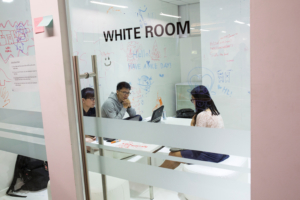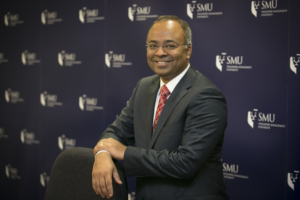COOL NEW BUILDING MEANT FOR 24-HOUR WORK
Demeester says it’s a very time-consuming class. He meets with students during each class session, and he also spends 45 minutes with each team outside of class every week and attends critical meetings with all of the business partners.
It’s a time-consuming class for the students, too. George says the school knows this, and encourages it. “We’ve got a nice new collaborative space,” he says of the SMU-X prototype facility named SMU Labs. “It’s sort of a California tech start-up kind of space. You can write on the walls, on the floor. There are one-touch recording rooms, a resting area, the whole bit.”
The building layout is meant to encourage collaboration among students, and also allows them to work 24 hours a day, if they so choose.
THE PROJECTS HAD MEASURABLE SUCCESS
One team in Demeester’s class worked with Louis Vuitton on a project for its flagship store in Singapore. The team worked to better match the company’s monthly staff rostering to foot-traffic in the store. “During very busy times, the sales were very good, but we found that they could improve their statistics if they had better staff levels on the floor during those busy periods,” Demeester says. “We helped them set it up.”
It was a very intense project, he says. The students were at the store more than once a week, and he was there himself once every two weeks, meeting with the store manager. In the end, the project improved foot-flow and sales.
Another team in Demeester’s class worked with Lee Pineapple, a pineapple processing company in Johor Bahru, Malaysia. Jiayi Chong, a student on the team, says the primary objective was to find a way to reduce waste. Students tracked manpower and machine maintenance and came up with quick solutions, like creating a visible waste-count to remind workers to be careful. Afterward they implemented long-term solutions, like having regular machine checks, and in the end, Chong says, they managed to reduce factory waste by 40%.

A third group worked with Liberty Insurance, hoping to improve the customer satisfaction of motor claim clients, team member Clarence Tan says. Their work involved identifying and capturing the end-to-end process of motor claims, he says, and identifying areas for improvement.
Both Chong and Tan say the hardest part of the course was applying lessons learned in class to their real-life situations. “To be honest, it felt like doing an internship and studying at the same time,” Chong says. But she liked the class, especially the satisfaction of helping clients and meeting new mentors and friends along the way. She also believes having the real-life experiences helped in her job search.
JOB OFFERS ARE CONCRETE RESULTS
Chong isn’t the only one who felt SMU-X helped her career prospects. Some students were even offered positions post-graduation by the business partners they worked with.
“That happens quite often,” Demeester says. “The graduates are quite capable, and if they show that in these projects, the companies find it attractive. They learn about the students. It’s a really great interview process. They can watch the students close by, and in the end, quite often you see companies reaching out.”
George agrees, saying the SMU-X program is a win-win for students and employers. “The way we think about this is, you can have access to our students, try them out, see how they solve problems, and see if these students are a good fit for you. You can have help with your challenges, and there’s a future career in it for the students.”












Questions about this article? Email us or leave a comment below.